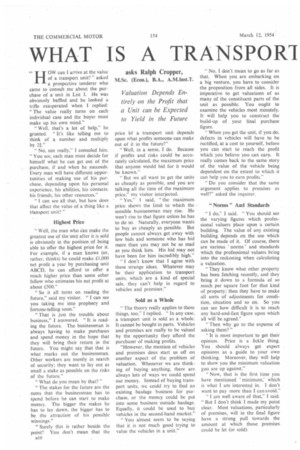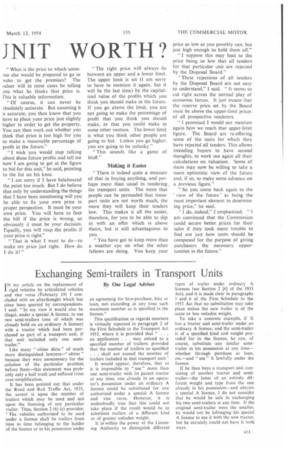WHAT IS A TRANSPOR1 JNIT WORTH?
Page 44

Page 45

If you've noticed an error in this article please click here to report it so we can fix it.
asks Ralph Cropper, M.Sc. (Econ.), B.A., A.M.Inst.T. HOW can I arrive at the value of a transport unit?" asked a prospective tenderer who came to consult rue about the purchase of a unit in List 3. He was obviously baffled and he looked a trifle exasperated when I replied: "The value really turns on each individual case and the buyer must make up his own mind."
"Well, that's a lot of help," he grunted. "It's like telling me to think of a number and multiply by 21."
"No, not really," I consoled him. "You see, each man must decide for himself what he can get out of the purchase, if and when he succeeds. Every man will have different opportunities of making use of his purchase, depending upon his personal experience, his abilities, his contacts. his friends, his other resources."
"I can see all that, but how does that affect the value of a thing like a transport unit?"
Highest Price "Well, the man who can make the greatest use of the unit after it is sold is obviously in the position of being able to offer the highest price for it. For example, if a man knows (or, rather, thinks) he could make £1,000 net profit a year by purchasing unit ABCD, he can afford to offer g much higher price than some other fellow who estimates his net profit at about MO."
"So it all turns on reading the future," said my visitor. "I can see you taking me into prophecy and fortune-telling soon."
"That is just the trouble about business," I answered. " It is reading the future. The businessman is always having to make purchases and spend money in the hope that they will bring their return in the future. You might say that that is what marks out the businessman. Other workers are mostly in search of security; they want to lay out as small a stake as possible on the risks of the future."
"What do you mean by that?"
"The stakes for the future are the sums that the businessman has to spend before he can start to make money. The bigger the stakes he has to lay down, the bigger has to be the attraction of his possible winnings."
"Surely this is rather beside the point? You don't mean that the a10 price 'of a transport unit depends upon what profits someone can make out of it in the future?"
"Well, in a sense, I do. Because if profits and risks could be accurately calculated, the maximum price that anyone would bid for it would be known."
"But we all want to get the units as cheaply as possible, and you are talking all the time of the maximum price," my visitor interjected.
Yes," I said, "the maximum price shows the limit to which the sensible businessman may rise. He won't rise to that figure unless he has to do so. Naturally, everyone wants to buy as cheaply as possible. But people cannot always get away with low bids and someone who has bid more than you may not be so mad as you think him. His bid may not have been for him incredibly high."
"I don't know that I agree with these strange ideas. Whatever may be their application to transport units, which are a kind of special sale, they can't help in regard to vehicles and premises."
Sold as a Whole
The theory really applies to those things, too," I replied. In any case, a transport unit is sold as a whole. It cannot be bought in parts. Vehicles and premises are really to be valued by the opportunity they afford the purchaser of making profits.
"However, the mention of vehicles and premises does start us off on another aspect of the problem of valuation. Whenever we are thinking of buying anything, there arc always lots of ways we could spend our money. Instead of buying transport units, we could try to find an existing haulage business for purchase, or the money could be put into some business outside haulage. Equally, it could be used to buy vehicles in the second-hand market."
You almost seem to be saying that it is not much good trying to value the vehicles in a unit." No, I don't mean to go as far as that. When you are embarking on a big venture, you have to consider the proposition from all sides. It is imperative to get valuations of as many of the constituent parts of the unit as possible. You ought to examine the vehicles most minutely. It will help you to construct the build-up of your final purchase figure.
When you get the unit, if you do, defects in vehicles will have to be rectified, at a cost to yourself, before you can start to reach the profit which you believe you can earn. It really comes back to the same story of the value of the vehicle being dependent on the extent to which it can help you to earn profits."
"Do you consider that the same argument applies to premises as well?" asked the inquirer.
"Norms" And Standards "I do," I said. "You should see the varying figures which professional valuers place upon a certain building. The value of any existing building depends on the use which can be made of it. Of course, there are various 'norms' and standards which the professional valuers bring into the reckoning when calculating a valuation.
"They know what other property has been fetching recently, and they bring it down to a formula of so much per square foot for that kind of property; then they have to make all sorts of adjustments for condition, situation and so on. So you can see how difficult it is to reach any hard-and-fast figure upon which all will be agreed."
"Then why go to the expense of asking them?"
"It is most important to get their opinion. Price is a fickle thing. You should always get expert opinions as a guide to your own thinking. Moreover, they will help to show you the minimum valuation you are up against."
"Now, that is the first time you have mentioned 'minimum,' which is what I am interested in. I don't want to pay more than I can avoid."
"I am well aware of that," I said. "But I don't think I made my point clear. Most valuations, particularly of premises, will in the final figure have a strong pull towards the amount at which those premises could be let (or sold). "What is the price to which someme else would be prepared to go in )rder to get the premises? The aluer will in most cases be telling jou what he thinks that price is. rhis is valuable information.
"Of course, it can never be ibsolutely accurate. But assuming it is accurate, you then know that you have to place your price just slightly higher in order to get the property. You can then work out whether you think that price is too high for you to make a reasonable percentage of profit in the future."
"I wish you would stop talking about these future profits and tell me how I am going to get at the figure to bid for this unit," he said, pointing to the list on his knee.
" I am sorry if I have belaboured the point too much. But I do believe that only by understanding the things that I have been mentioning will you be able to fix your own price in proper perspective. It must be your own price. You will have to foot the bill if the price is wrong, so obviously it must be your decision. Equally, you will reap the profits if your price is right."
"That is what I want to do—to make my price just right. How do I do it?"
" The right price will always lie between an upper and a lower limit. The upper limit is set (I am sorry to have to mention it again, but it will be the last time) by the capitalized value of the profits which you think you should make in the future. If you go above the limit, you are not going to make the percentage of profit that you think you should make, or that you could make in some other venture. The lower limit is what you think other people are going to bid. Unless you go higher, you are going to be unlucky."
"This sounds like a game of bluff."
Making it Easier
There is indeed quite a measure of that in buying anything, and perhaps more than usual in tendering, for transport units. The more that people can be persuaded that transport units are not worth much, the more they will keep their tenders low. This makes it all the easier, therefore, for you to be able to slip in with an offer which is above theirs, but is still advantageous to you.
"You have got to keep more than a weather eye on what the other fellows are doing. You keep your
price as low as you possibly can, but just high enough to hold them off." "I suppose this may lead to the price being so low that all tenders
for that particular unit are rejected by the Disposal Board."
"These rejections of all tenders by the Disposal Board are not easy to understand," I said. "It seems to cut right across the normal play of economic forces. It just means that the reserve price set by the Board must be above the upper-limit prices of all prospective tenderers.
" I promised I would not mention again how we reach that upper-limit figure. The Board are re-offering some of the units for which they have rejected all tenders. This allows intending buyers to have second thoughts, to work out again all their calculations on valuation. Some of them may now be willing to take a more optimistic view of the future and, if so, to make some advance on a previous figure."
"So you come back again to the ' view of the future' as being the most important element in determining price," he said.
" I do, indeed," I emphasized. "I am convinced that the Commission could secure better prices for their sales if they took more trouble to find out just how units should be
composed for the purpose of giving purchasers the necessary opportunities in the future."




































































































